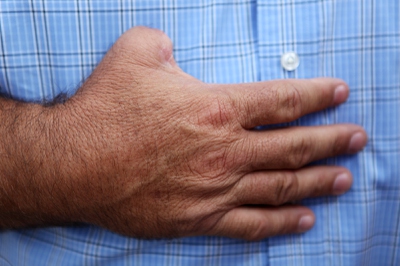
Bo Hash lost his thumb on his right hand in a rodeo roping incident in 2012. He believes that he was overbilled by St. Rose Dominican Hospitals. Hash was photographed at the Henderson Saddle Association on Thursday, May 16, 2013.
Tuesday, May 28, 2013 | 2 a.m.
Map of St. Rose Dominican Hospitals - Rose de Lima Campus
Bo Hash arrived at St. Rose Dominican Hospitals — Rose de Lima Campus with two Bounty paper towels wrapped around his bloodied right hand and his thumb in a red Dixie cup.
Not more than an hour earlier, the thumb had been caught in a rodeo rope, popping it off his hand. Even through the pain, his instincts from his job as a Progressive insurance agent kicked in. First he found his thumb and put it on ice, then he called St. Rose. His health insurance policy had a high deductible, and Hash wanted to avoid two hospital bills.
“I said, ‘Hey listen, I just cut my thumb off. I’ve got it in a bag; the bag is on ice. … Do you have the facilities and capabilities of doing (a reattachment),’” Hash said.
When he arrived, he said the hospital staff assured him St. Rose could treat him. He was admitted into the emergency room, where he received three X-rays, a tetanus shot and pain medication. Then the hospital told him he had to be transferred to University Medical Center because it did not have the resources to help him.
“I lost it,” Hash said. “I said, ‘Are you ‘blankin’ serious?’”
He refused an ambulance and had his family drive him to UMC, with his thumb still in the cup and two paper towels still wrapped around his hand. The spot where his thumb had been resembled a cleaned chicken wing drumette bone.
This is how Hash lost his thumb March 28, 2012. The visit at St. Rose lasted less than two hours, but it has haunted him for the better part of a year. The hospital sent him a $5,000 bill, pushing his deductible to the brink. Even worse to Hash, he believes the hospital misled him and is overcharging him for services he believes he didn't receive.
It is a situation that is far from unique for patients in Southern Nevada and across a country where hospitals everywhere are diagnosed with overcharging. Hash plans to fight the bill.
• • •
Inside almost every hospital system exists a giant list called the chargemaster. It is the all-knowing brain hospitals use to determine what to bill patients for services. St. Rose’s chargemaster is set by its corporate owner, Dignity Health. Like the brain, the chargemaster is developed internally and extremely complex.
Chris Cochran, a health care and administration policy professor at UNLV, said prices typically are set at an inflated level so that hospitals can receive the most money when it negotiates prices with insurance companies. Medicare and Medicaid pay a much lower rate, and the higher prices help the hospitals recoup that lost income.
Yet how those prices are determined baffles Cochran and often leaves an uninsured patient with an exorbitant bill they couldn’t hope to pay.
“When it comes to patients understanding the chargemaster, it is extremely complicated. They’ll never understand.” Cochran said. “I don’t want to say there’s a magic formula, but sometimes I think (hospitals) just make up (the prices).”
This issue was brought to the forefront earlier this year in an extensive Time magazine article investigating the medical care billing system. The story uncovered patients who received bills charging them $1.50 for a single dose of Tylenol and 400 percent markups on life-saving drugs.
One patient was billed $21,000 by Stamford Hospital, a private, nonprofit institution in Connecticut, for an emergency room trip that determined the man had heartburn. In all, the story found that Americans will likely spend $2.8 trillion annually on health care, which is about $750 billion more than other similarly developed countries spent, when calculated on a per capita basis.
In Southern Nevada, the problem is just as prevalent. Data released by Medicare and Medicaid showed valley hospitals often charge the government more than the national average for most procedures. For an uninsured patient, that charge can be higher.
However, some hospitals do offer discounts, including up to 50 percent off for patients who pay in cash. Still, Cochran said many patients don’t realize they can negotiate if they don’t have insurance, which leaves many victims of overcharges.
“The problem is for people who don’t have insurance, they go into the hospital and get charged what hospitals say the full charges are,” Cochran said. “If he doesn’t have insurance, then (hospitals) are going to say, 'This is what we charge.' They’re not going to tell him going in what this is going to cost. They’re going to do the work and then charge him.”
• • •
On a recent spring afternoon, Hash fingered through a manila folder full of documents from his trip to St. Rose more than a year ago. His 30 years as an insurance agent have taught him to never throw away documents.
His thumb has been rounded off into a near-useless nub on his right hand. He can operate without it, but simple tasks like buttoning a shirt, typing and writing have become extremely difficult without the opposable digit. Meanwhile, he wears slip-on shoes because tying shoelaces is too difficult, but he has moved on. He’s learned to rope cattle without a thumb. Life goes on, he says.
At last, he finds what he’s looking for. He pulls out his billing statement from St. Rose. On it, the list of charges include: three X-rays for $732, a tetanus shot for $317 and a $2,578 Emergency Room Level 5 admissions charge. The bill totals $4,987, but his insurance company has negotiated it down to half of that.
“When all this stuff happened, I went down and met their patient advocate. I said, ‘Hey all this stuff is wrong. I’ll pay you for the X-ray and pain shot. I’m not paying you for the bandage of my hand, the treatment of my hand — none of the things you said you did and level of trauma you charged me,’” Hash said. “To me, that’s why our insurance charges are so out of hand.”
Hash has spent the better part of the year trying to resolve his bill with St. Rose and learn more about how he was treated at both St. Rose and University Medical Center.
“This whole thing, it could’ve been avoided if they didn’t tell us they could help him,” said Angela Hash, Bo’s wife. “He’s a good guy, honest. If they would have told us no they can’t, it would’ve been a different thing. Them telling us yes they could take care of him then, from that time on, it just lost us time.”
After Bo Hash left St. Rose, he was forced to wait six hours in the UMC emergency room before hand surgeon Dr. Andrew Bronstein met him for surgery. It wasn’t until then that Hash learned a replantation medical team had determined his hand was too damaged for reattachment. But Hash still wonders if the length of time he waited before surgery played a role in losing his thumb.
In a letter Hash said he received from Bronstein, Hash learned he was bumped twice for surgery because his hand was not a candidate for reattachment. He also learned that Bronstein was also a hand surgeon on call at St. Rose de Lima but was never contacted.
Bronstein did not return calls from the Sun to verify the letter, but Hash produced an email from Bronstein referencing the letter.
Hash is frustrated by his treatment at UMC, but he has accepted the outcome. He feels St. Rose, however, is charging him for treatment he didn’t receive. Hash said St. Rose has refused or not responded to multiple calls to sit down with him to discuss the charges.
Health Insurance Portability and Accountability Act regulations prevented hospital officials from commenting on Hash’s visit with the Las Vegas Sun. Meanwhile, St. Rose officials declined to comment on the specific charges that make up an ER visit, saying only that the charges are set at a corporate level, not locally.
“Bottom line is they know, they know,” Hash said. “They just figure I’m like anybody else, and I’ll give up.
His next step is a small-claims court, where Gerald Gillock, a medical malpractice attorney and friend of Hash’s, said Hash has a good chance to win. Still, it is a unique step not many take.
“I’ve never seen anybody take it to small-claims court or take it in and make them justify the charges,” Gillock said. “They got to have an accountability. I think they should’ve sat down with him and gone over the charges and absolved him of it.”
Hash knows the case will never grow his thumb back. It was a risk he took when he decided to take up the rodeo sport of team-roping, and he’s learned to adapt without the digit. He has owned up to that fact.
Now, he said, it’s the hospital’s turn.


Join the Discussion:
Check this out for a full explanation of our conversion to the LiveFyre commenting system and instructions on how to sign up for an account.
Full comments policy